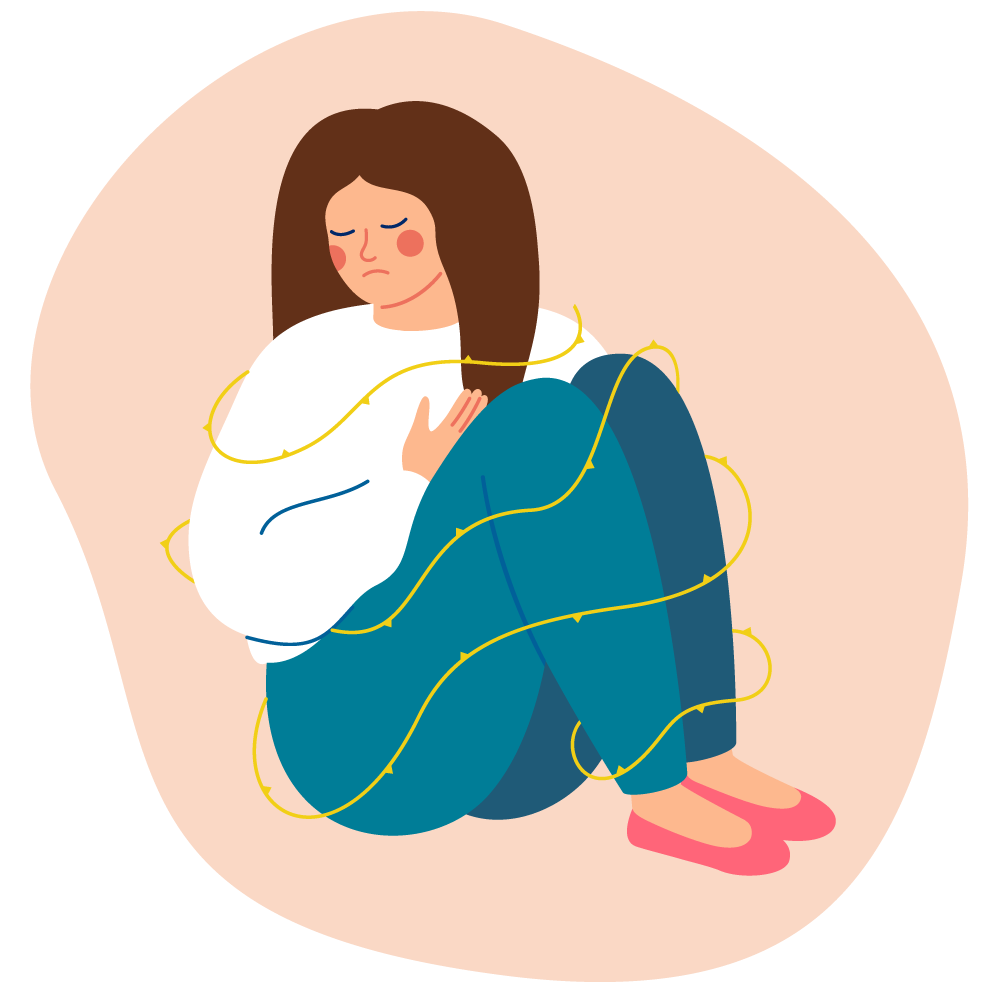Eating Disorder Therapy in Marietta and Roswell
Break free from disordered eating, and experience a healthier relationship with food and your body.


Are You Preoccupied With Thoughts About Food, Weight, Or Body Image?
- Have you or your child become consumed by a desire to control weight through restricted eating and/or excessive exercise?
- Does your relationship with food take priority over establishing closer connections with others?
- Has constant worry over weight gain left little time to focus on anything else?
Struggling with an eating disorder or body image concerns can feel like an endless battle. It's not just about the food—it's about the emotions, the beliefs, and the underlying factors driving your behaviors. You may find yourself trapped in a cycle of restriction, bingeing, purging, or obsessive thoughts about food and your body.
Your Desire To Maintain An Ideal Body Weight May Be
All-Consuming
Maybe you notice that you:
- Experience a constant preoccupation with food, weight, or body shape;
- Feel a loss of control around food as well as guilt, shame, or disgust after eating;
- Use food as a way to cope with difficult emotions;
- Avoid social situations that involve food;
- Engage in secretive behaviors around eating, such as bingeing or extreme dieting;
- Keep friends and loved ones at a distance, fearing they may express concern about you.
These struggles can take a toll on your mental and physical health, impacting your relationships, work, school, and overall quality of life. Rather than being fully present and engaged in the world around you, you may feel like all of your time and energy is focused on food and body image. No matter how hard you try to attain perfection, constant worry keeps you in a state of fear.
Fortunately, eating disorder therapy can help you or your teenage child break free from the never-ending anxiety surrounding food and body image. With counseling, you can get off the hamster wheel of food addiction and discover the world that exists outside of counting calories.
Contact Us
Have a question? Feel free to reach out to us using our contact form.
Eating Disorders Are More Common Than
You May Think
According to the National Eating Disorders Association (NEDA), “An estimated 9 percent of the U.S. population, or 28.8 million Americans, will have an eating disorder in their lifetime.” Further, although “15 percent of women will suffer from an eating disorder by their 40s or 50s, only 27 percent receive any treatment for it.” [1]
Eating disorders are multifaceted, complex diseases that affect both our physical, mental, and emotional well-being. Because their underlying causes are compounded by a combination of psychological and cultural factors, eating disorders can never be distilled down to only one reason. Consequently, overcoming eating disorders requires a holistic approach that addresses mind, body, and spirit.
 Modern Diet Culture Exacerbates Disordered Eating
Modern Diet Culture Exacerbates Disordered Eating
We live in a world that for decades has been steeped in diet culture. Sadly, the warped idea that achieving the “perfect” body is synonymous with living a perfect life has become normalized and unquestioned. This belief has perpetuated the notion that an inability to attain a certain body size indicates personal failure. With our self-worth inextricably tied to how we look, many of us become consumed with weight and outward appearance for validation.
Because eating disorders develop as a way of managing uncomfortable or difficult emotions, it can be difficult to shift away from these entrenched ways of coping on your own. Therapy offers a safe place to explore the underlying causes of your eating disorder with a counselor. Our experienced therapists work with a range of eating disorder treatments, including anorexia nervosa, bulimia nervosa, binge eating disorder, orthorexia, food addiction, and Other Specified Feeding or Eating Disorders (OSFED). In eating disorder therapy, we also address concerns related to body image, self-esteem, and emotional eating.

Eating Disorder Therapy Can Help You Change Your Relationship With Food
As therapists who understand the intricacies of eating disorders, we know that you or your teen may be reluctant to consider therapy. The idea of having the way you organize and control your life taken away from you can be a scary prospect.
However, your counselor will meet you where you are. An eating disorder is more than its symptoms. Part of our work together will be to identify its function, meaning, what your disordered eating has provided you, and how it has helped you cope. From there, we can explore more effective ways to get your needs met and think about what recovery looks like for you.
As therapists, we strive to be person-centered, strengths-based, and collaborative. We will discuss what works and doesn’t work for you and decide on the next steps together. Our goal will be to get you to a place where feel ready to let go of unhealthy habits and behaviors and make changes that will benefit you in the long term.
The Modalities We Use In Eating Disorder Treatment
Using evidence-based eating disorder treatments such as Cognitive Behavioral Therapy (CBT), Dialectical Behavior Therapy (DBT), and Acceptance and Commitment Therapy (ACT), our therapists can support you in letting go of perfectionism and finding freedom. CBT is a therapeutic approach that helps you recognize and change unhealthy patterns of thinking and behavior related to food, body image, weight, binge eating disorder, and food addiction.
DBT combines cognitive-behavioral techniques with mindfulness practices, emphasizing skill-building in emotion regulation, distress tolerance, interpersonal effectiveness, and mindfulness. DBT helps you develop healthier coping mechanisms, improve emotional regulation, reduce unhelpful behaviors, and have a more balanced relationship with food and body image.
Acceptance and Commitment Therapy (ACT) aims to help you accept your thoughts and feelings rather than fight against them, while also committing to making behavioral changes that align with your values. Additionally, Family-Based Treatment (FBT) can be particularly effective in helping adolescents overcome disordered eating.
Imagine if you could…

- Feel more at ease around food, enjoying meals without guilt or fear;
- Develop a more positive body image and self-esteem;
- Learn healthier ways to cope with stress, anxiety, and difficult emotions;
- Reconnect with activities and relationships that bring you joy and fulfillment;
- Experience greater freedom and flexibility in your relationship with food and your body;
- Approach life with confidence, vitality, and a sense of empowerment.
Our Approach to Body Image Issues and
Disordered Eating
We understand that your journey with food and body image is unique, and therefore, we tailor our approach to meet your specific needs. What sets us apart is our ability to take a comprehensive team approach when necessary. We can coordinate care with other healthcare professionals, ensuring you receive holistic support. Additionally, we collaborate with dieticians when appropriate, ensuring a multidisciplinary approach to treatment.
With help and support, you can gain more understanding about yourself and the life you want to live—one that is full and enables you to have goals that align with your values, connection with others, and a sense of purpose.
But Maybe You’re Not Sure If Eating Disorder Therapy Is Right For You…
Although starting therapy can feel overwhelming for anyone, that can be especially true for someone struggling with an eating disorder. You may worry that your therapist will judge you or try to "take away" your eating disorder when it may be the only coping skill you have. Or perhaps you’re scared your body will change. These are all understandable fears that, unfortunately, can keep you stuck. In eating disorder therapy, your counselor will meet you where you are and help address whatever concerns you may have.
We strive to make therapy a collaborative partnership that benefits your well-being. To ensure that we’re always making the most of your time, we constantly check in with you throughout counseling and evaluate your progress. If you are not making incremental progress in eating disorder counseling, we will alter your treatment plan or switch you to another counselor.
Our therapists are trained in Dialectical Behavioral Therapy (DBT), Cognitive Behavioral Therapy (CBT), Acceptance and Commitment Therapy (ACT), and mindfulness, all demonstrated to be effective treatments for eating disorders. You will be matched with a counselor who specializes in treatment related to eating disorders, including anorexia, bulimia, food addiction, and binge eating.
Yes, therapy can definitely help with body image issues even if you don't have a diagnosed eating disorder. Our therapists are experienced in addressing concerns related to body image, self-esteem, and emotional eating. Therapy can help you develop a healthier relationship with your body. Therapy can aso help you learn to appreciate your body for more than just its appearance and build a positive self-image. Our therapists can provide you with the tools to help you with various body image concerns.
Food Doesn’t Have To Control Your Life
It's possible to free yourself from an unhealthy relationship with food. If you would like to find out more about eating disorder therapy with Awaken Counseling, you can click here to schedule a free 15-minute call.
Sources:
[1] https://anad.org/eating-disorder-statistic/
Need some advice? We made this content just for you.

 Modern Diet Culture Exacerbates Disordered Eating
Modern Diet Culture Exacerbates Disordered Eating




